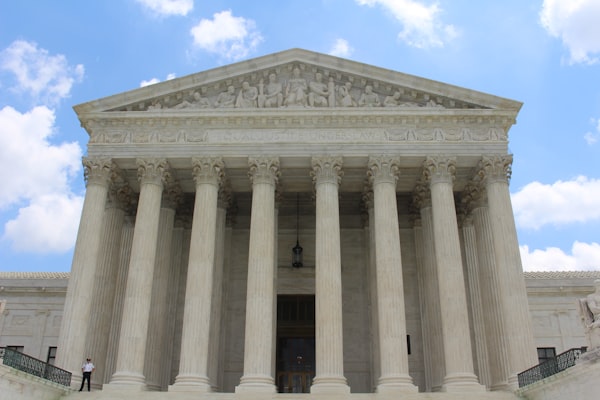SCOTUS & Fifty Independent States
The [Way Less] United States

As the imminent collapse of Roe v Wade attracts the attention of the national audience, a pattern of challenge to the power of the federal government is coming into focus.
The Fifth Circuit appears to be taking the lead on moving cases to the Supreme Court. Cases come in the form of negation (e.g. removing federal protections around abortion) or assertion (e.g. Texas redefining the First Amendment in a way to maximize state power). Either way, the overall intent is to move power from the federal government to the states. The bet for lower courts is that if the Supreme Court no longer feels restrained by precedent, there is no reason not to send along a case with a wishlist for a new ruling. It’s a bold new states rights world at the Supreme Court.
If you aren’t sure about the extent to which states rights now dominate thought at the Supreme Court, I highly recommend reading the leaked draft. It’s all over the text. While legal minds may find the logic dubious, it’s the Supreme Court we have, likely for at least the next decade.
The notion of states rights as a philosophical underpinning for racist, authoritarian movements goes back to before the Civil War. What’s new is the composition of the Supreme Court established during the Trump administration. The Roe v Wade leak is important not just for delivering a decades-long goal to evangelicals; the text discussing the diminution of federal power sets up a model for delivering on the goals of the entire Republican coalition. Libertarian, authoritarian, evangelical, racist - whatever the specifics may be, limiting federal government has been the unifying rallying cry for decades.
This transition toward the state power is likely to be the most compelling talking point for Republicans across the board. Given the combination of poor polling for federal institutions and an inability to pass legislation, it’s easy to see broad popularity for increased state level governance.
Let’s take a quick tour of a few policy changes a state-first candidate might offer:
- End the drug war by explicitly stating that drug policy is better served on a state-by-state basis. Cannabis friendly states can legalize and tax, those that don’t want can ban or limit however they wish.
- End the EPA, stating that environmental regulations belong the residents.
- End Medicare, Medicaid and the ACA, stating that states can regulate health care as they see fit.
- End Social Security as a national program. Anyone who currently has paid in will receive benefits according to existing program rules, but there will be no future payroll deductions and no future program increases. The current Social Security obligations will be treated as any other federal debt. Leave it to states to set up programs as they see fit going forward.
- With each cancelled program, announce significant federal tax cuts. It’s up to the states to either increase taxes or abandon the programs.
All of these are easy to imagine developing under the current SCOTUS,1 with the gutting of the EPA already underway. It’s also not too hard to imagine an ambitious national political candidate settling on states rights as a way to garner broad political support.
As an aside, one of the losers in this scenario could be large corporations. One complication of federal rule-making is that provides a single entity to target for lobbying. Perhaps the most famous example is the EPA itself, created during the Nixon administration. By making the EPA the final arbiter for environmental policy, it made the life of the polluting industrialist in many ways much easier - one set of lobbyists, one set of federal legislators, one agency. A sea of local NIMBY environmental movements is impossible to manage; hence the Nixon administration decision to nationalize.
Potentially a transition away from federal programs could work to the advantage of state level Democrats, as they can focus on delivering targeted programs to their constituents. For example, after the Supreme Court strikes down Social Security, Governor Newsom might announce a program specific to Californians continuing the program, along with a wishlist of reforms. Similar transitions would dramatically increase the profile of all state government.
In a states rights scenario, many states might wind up working together to share programs. As an example of where the national system and the states diverge, consider automotive emissions. The states on the West coast and the North have agreed to follow various aspects of the California emissions program, whereas the rest of the states follow the federal rules. In the case of a new, state-driven Social Security, California, Oregon and Washington might decide to share program administration and allow for portability of work credits across state lines.
Perhaps after time, like minded states may choose to formalize these relationships in a pattern not-too-far from the relationships described in A More Perfect Union. In this scenario, the federal government mainly manages the military and certain high level economic aspects, but virtually all social programs move to state/multi-state compacts.
I suspect that the success of the Republican party over the next few years may lie in how focused they are on states rights versus imposing their views (especially on social issues) on the nation. As I mentioned in the previous newsletter, this will have the net effect of dramatically increasing the differences between the lived experience in each state. As long as the states maintain open borders, individuals who have the ability to move will do so, increasing the great sort. A DeSantis presidency based on far-right evangelical beliefs might prove challenging, but a presidency based on states rights, ending federal programs and cutting federal taxes might do the trick.
Most Democrats are feeling considerable nervousness over the Senate and House 2022 elections, as well as the 2024 presidential election. For those Democrats, transitioning to state run programs may be the best possible option to avoid catastrophe. The single most damaging attack on a potential national health care service similar to the UK NHS, or any other federal program? Just add “run by the Trump family” or DeSantis or Abbott to the description of every federal program. That suffix tends to make the federal apparatus far less appealing for even the most pro-government Democrat.
Strange days.
As always, if you have any questions or thoughts, let me know.
- Alex
P.S. I highly recommend checking out the newsletter sent out by Heather Cox Richardson. She sends out an incredibly well written newsletter on a daily basis, a truly astonishing feat.
P.P.S. The Texas GOP has apparently adopted a referendum on secession as an official platform. The legal aspects, including the possibility of a federal amendment, Supreme Court rulings, and the text of the Texas state constitution make for a complicated mess. Regardless, it’s hard to overstate the impact of a popular vote in favor of secession. Just like the referendum vote over Brexit, things could evolve relatively quickly.
The only superficial exceptions to this may be gun rights. While it’s possible the SCOTUS may view any gun legislation as an infringement to the Second Amendment, it may choose to shift to allowing most adults to buy guns but largely respect individual states around age restrictions and licensing to states. A New York gun permit law is one of the cases coming up, and it will be interesting to see how it settles out. Regardless, it appears that for most adult Americans guns will remain widely available for the foreseeable future. ↩



